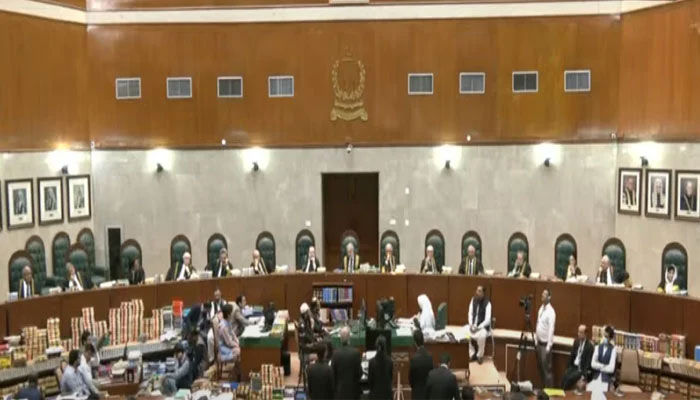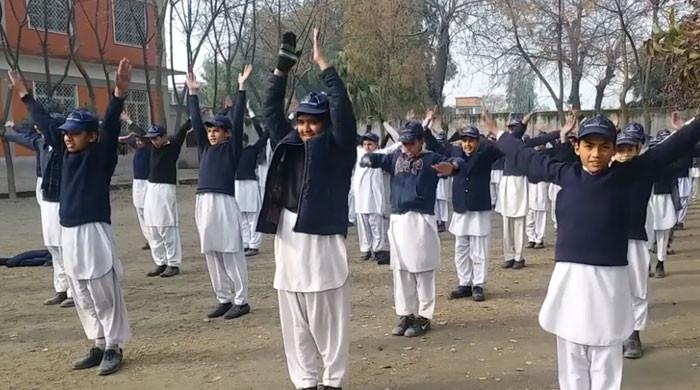 Full court led by CJP Qazi Faez Isa (Centre) is hearing petitions against SC law in this still taken from a video on October 9, 2023. — YouTube/PTVNews
Full court led by CJP Qazi Faez Isa (Centre) is hearing petitions against SC law in this still taken from a video on October 9, 2023. — YouTube/PTVNewsISLAMABAD: The Supreme Court has resumed the hearing of the petitions challenging the Supreme Court (Practice and Procedure) Act 2023.
Chief Justice of Pakistan (CJP) Qazi Faez Isa-led full-court bench consisting of all 15 judges of the Supreme Court including Justice Sardar Tariq Masood, Justice Ijaz Ul Ahsan, Justice Syed Mansoor Ali Shah, Justice Munib Akhtar, Justice Yahya Afridi, Justice Aminuddin Khan, Justice Sayyed Mazahar Ali Akbar Naqvi, Justice Jamal Khan Mandokhel, Justice Muhammad Ali Mazhar, Justice Ayesha A. Malik, Justice Athar Minallah, Justice Syed Hasan Azhar Rizvi, Justice Shahid Waheed and Justice Musarrat Hilali is hearing the case.
The hearing is broadcast live on state-run PTV. It is the fifth live streaming of the hearing.
All the petitioners have already completed their arguments and now Attorney General for Pakistan (AGP) Mansoor Usman Awan is arguing before the bench as the court is expected to conclude the proceedings today.
Today’s hearing
When the court gathered AGP Mansoor Usman Awan came to the rostrum and started his arguments.
“You are last but not the least, CJP Isa remarked when the AG took to the rostrum.
The AGP said he will respond to the three questions raised during the course of the hearing.
“I will talk about Article 191 and the independence of the judiciary,” he said.
The AGP said he will argue about the Parliament being the master of the roster, the right to appeal and the question of appeal against the decision of a full court.
“The fundamental rights enshrined in Articles 14, 20, 22 and 28 are exercised in accordance with the law,” Awan said, addressing judges of the apex court.
He added that the right to privacy is regulated by law and also spoke about Article 191 empowering Parliament to legislate.
“Are you saying that the word law in Article 191 is different from the use of this word in other constitutional provisions?” the chief justice asked the AGP.
The law
The law gave the power of taking sou motu notice to a three-member committee comprising senior judges including the chief justice. It further aimed to have transparent proceedings in the apex court and includes the right to appeal.
Regarding the constitution of benches, the Act stated that every cause, matter or appeal before the apex court would be heard and disposed of by a bench constituted by a committee comprising the CJP and the two senior-most judges.
It added that the decisions of the committee would be taken by a majority.
Regarding exercising the apex court's original jurisdiction, the Act said that any matter invoking the use of Article 184(3) would first be placed before the committee.
On matters where the interpretation of the Constitution is required, the Act said the committee would compose a bench comprising no less than five apex court judges.
About appeals for any verdict by an apex court bench that exercised Article 184(3)‘s jurisdiction, the Act said that the appeal would lie within 30 days of the bench’s order to a larger SC bench. It added that the appeal would be fixed for hearing within a period not exceeding 14 days.
It added that this right of appeal would also extend retrospectively to those aggrieved persons against whom an order was made under Article 184(3) prior to the commencement of the SC (Practice and Procedure), Act 2023, on the condition that the appeal was filed within 30 days of the Act's commencement.
The Act additionally said that a party would have the right to appoint its counsel of choice for filing a review application under Article 188 of the Constitution.
Furthermore, it states that an application pleading urgency or seeking interim relief, filed in a cause, appeal or matter, shall be fixed for hearing within 14 days from the date of its filing.

 6 months ago
66
6 months ago
66





